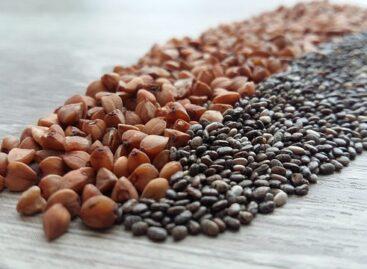Dr Beáta Olga Felkai: “One of the Hungarian presidency’s priority topics will be the fight against food loss and waste”
Dr Beáta Olga Felkai, deputy state secretary for food chain supervision and trade policy at the Ministry of Agriculture has given us an insight into the challenges, government responses and the objectives to be achieved during Hungary’s EU presidency.
This article is available for reading in Trade magazin 2024/6-7
![]() – What were the most important events and challenges for the food industry and food trade in Hungary in 2023?
– What were the most important events and challenges for the food industry and food trade in Hungary in 2023?

Dr. Beáta Olga Felkai
deputy secretary of state
Ministry of Agriculture
– The combination of rising raw material prices, other input costs, weak domestic demand and declining exports led to a drop in food production volumes already at the end of 2022. This trend only took a U-turn at the end of the summer and we can say that we have seen growth again since the beginning of 2024. For many years the food industry has owed a large part of its success to exports, but last year export sales also decreased, in some cases by more than the extent of the domestic decline.
![]() – How has the government reacted to the global challenges the food industry has to face, such as rising commodity prices or the logistics problems?
– How has the government reacted to the global challenges the food industry has to face, such as rising commodity prices or the logistics problems?
– We have primarily focused on the support side. In addition to channelling previous funding experience, new impulses have also been integrated into the CAP ST calls that are now taking shape. The next grant programmes will focus on cooperation, predictable raw material sourcing and distribution channels, energy efficiency and sustainability. The supplier development support programme, launched at the end of last year, also seeks to strengthen the supply chain approach with new ideas and easily marketable development results.
![]() – What steps has the government taken to protect consumer interests, in particular to stabilise food prices?
– What steps has the government taken to protect consumer interests, in particular to stabilise food prices?
– We wish to stimulate consumption, for example by introducing the mandatory price discounts and the price monitoring system. But we hope that with consumption returning to normal, we will be able to concentrate once again on the active presence of quality food – preferably Hungarian groceries.

Joint thinking with organisations is of importance
![]() – What are the most important objectives and tasks that Hungary intends to achieve during its EU presidency in the food sector?
– What are the most important objectives and tasks that Hungary intends to achieve during its EU presidency in the food sector?
– We have both compulsory tasks and priorities that we can choose ourselves. One of the Hungarian presidency’s priority topics will be the fight against food loss and waste, with a conference in Budapest planned for the autumn. We want to focus on food waste across the whole food chain, even if more than half of the food waste is generated by households, as we throw away nearly 60kg of food per person a year, which means losing about HUF 40,000 per person. As another important topic, the Permanent Representation of Hungary in Brussels is planning to organise a trade event on the role, naming and experiences of member states in connection with food imitations and substitutes, focusing on the topic of lab-grown meat. In the domain of animal protection, the European Commission has had ambitious objectives (such as animal welfare labelling of foodstuffs or animal welfare standards for livestock farming), which eventually led to the adoption of draft regulations on animal welfare requirements during transport and related operations. The draft on transport is expected to be discussed at expert level during the Hungarian presidency. Last year’s multi-element food labelling dossier was also ambitious: this would have included many elements, from front-of-pack nutrition labelling (FOPNL) to origin labelling and date labelling, but negotiations either didn’t start or didn’t make major progress. A special report on food labelling by the European Court of Auditors is expected by the end of the year. If it is published in time, we will prepare a European Council conclusion. //
Related news
The government is providing significant resources to support the development of crop dryers.
🎧 Hallgasd a cikket: Lejátszás Szünet Folytatás Leállítás Nyelv: Auto…
Read more >Protein, gut health and mental wellbeing – these trends will shape global food innovation in 2026
🎧 Hallgasd a cikket: Lejátszás Szünet Folytatás Leállítás Nyelv: Auto…
Read more >Forced paths: trends and decisions in 2026
🎧 Hallgasd a cikket: Lejátszás Szünet Folytatás Leállítás Nyelv: Auto…
Read more >Related news
Pálinka, my love…
🎧 Hallgasd a cikket: Lejátszás Szünet Folytatás Leállítás Nyelv: Auto…
Read more >







